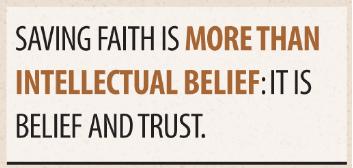ASK THE PASTOR WITH DALE RATZLAFF | Pastor and Founder, Life Assurance Ministries (1936–2024
FIRST PUBLISHED IN THE PRINT VERSION OF PROCLAMATION! MAGAZINE, WINTER, 2015.
Doesn’t the parable of the Sower teach that a believer can fall away?
Most of the readers of Proclamation! are familiar with this parable—often called the parable of the soils—as it is recorded in all the synoptic gospels (Mt. 13:2-9; Mk. 4:1-9; Lk. 8:4-15). In short, the Sower’s seed fell on four different soils: hard and impenetrable, rocky, weedy, and good. The seeds on the hard soil were eaten by birds; the seed on the rocky soil sprouted plants which withered quickly without water or firm roots. The seed in the weedy soil were choked by the encroaching thorns, and the seed on the good soil yielded a crop “a hundred times as great” (Lk. 8:8). How are we to understand this parable?
And those beside the road are those who have heard; then the devil comes and takes away the word from their heart, so that they may not believe and be saved (Lk. 8:12).
It is clear this group hears the gospel, but the message of Christ does not penetrate into the heart to bring repentance and true saving faith. It is the next type of soil (people) that raise the question asked at the beginning, “Can a believer fall away”?
And those on the rocky soil are those who, when they hear, receive the word with joy; and these have no firm root; they believe for a while, and in time of temptation fall away (Lk. 8:13).

Saving faith is more than intellectual belief: it is belief and trust. Notice that the people in this category “fall away” when tested. In other words, they really did not trust the word of the gospel. One reason God allows us to be tested is to show us whether we have saving faith or just intellectual belief without willingness to trust our lives to God.
Beloved, do not be surprised at the fiery ordeal among you, which comes upon you for your testing (1 Pet. 4:12). And not only this, but we also exult in our tribulations, knowing that tribulation brings about perseverance; and perseverance, proven character; and proven character, hope (Rom. 5:3-4).
And others are the ones on whom seed was sown among the thorns; these are the ones who have heard the word, and the worries of the world, and the deceitfulness of riches, and the desires for other things enter in and choke the word, and it becomes unfruitful (Mk. 4:18-19).
Those in this group also do not exhibit saving faith. They hear the “good news” but the “deceitfulness of riches” and worldly pleasures pull them away from real saving faith. Like the rich young ruler, they are unwilling to give up what they love the most for the sake of the gospel.
The last group exhibit true, saving faith.
And the seed in the good soil, these are the ones who have heard the word in an honest and good heart, and hold it fast, and bear fruit with perseverance (Lk. 8:5-15).
And those are the ones on whom seed was sown on the good soil; and they hear the word and accept it, and bear fruit, thirty, sixty, and a hundredfold (Mk. 4:20).
In conclusion, the parable of the Sower does not teach that a true believer will fall away. It does, however, teach that saving faith is a real thing that changes the life. It is more than saying the words, “I believe”. Saving faith continues to trust God even in difficult times. †
- 19. The Rest that Remains - July 17, 2025
- 18. Jesus, the Law’s Fulfillment - July 10, 2025
- 17.A Better Law - July 3, 2025
